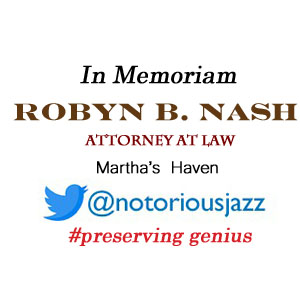
Jazz Poems
SHAKING HANDS WITH MONGO
for Mongo SantamariaMongo’s open hands
huge soft palms
that drop the hard seeds
of conga with a thump,
shaken by the god of hurricanes,
raining mambo coconuts
that do not split
even when they hit the sidewalk,
rumbling incantation
in the astonished dancehall
of a city in winter,
sweating in a rush of A-train night,
so that Chano Pozo,
maestro of the drumming Yoruba heart,
howling Manteca in a distant coro,
hears Mongo and yes,
begins to bop
a slow knocking bolero of forgiveness
to the nameless man
who shot his life away
for a bag of tecata
in a Harlem bar
forty years ago
Martín Espada | 1957
from Jazz Poems ~ Selected and Edited by Kevin YoungMore Posts: book,classic,collectible,history,jazz,library,poet
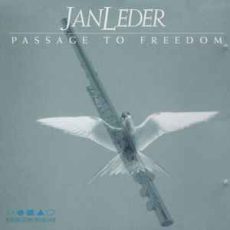
Daily Dose Of Jazz…
Jan Leder was born May 19, 1958 and raised in New York City and pursued her love for improvisation after twelve years of studying classical music. She studied for three years with pianist Lennie Tristano and then continued her jazz studies with pianist Connie Crothers for over ten years. A self-styled course of study in jazz history at SUNY Purchase led to her compilation of the first comprehensive history of women in jazz titled Women in Jazz: A Discography of Instrumentalists 1913-1968.
In February 1997 Monad Records released her first recording, Passage To Freedom, which was recorded live at the Five Spot in New York City. In 1999 Jan recorded Nonchalant, a collection of mostly original melodies.
Ms. Leder leads her own jazz ensembles in the New York City area, appearing at nightclubs, festivals, cultural functions and other public and private engagements. Her repertoire includes standard bebop, swing, blues and bossa novas as well as her own unique jazz compositions and those of her musical colleagues, including drummer/big band leader Art Lillard, with whom Jan collaborated on numerous compositions, mostly writing lyrics to his catchy songs.
From 1987 to 2012 Jan was a member of the flute section in Art Lillard’s Heavenly Band. Jan was also a member of a group of jazz flutists called the NY Jazz Flutet that included Dotti Anita Taylor, Elise Wood, Michele Smith and Chip Shelton along with drummer Art Lillard.
She entertains at healthcare facilities, teaches workshops and seminars, plays at fundraisers and jazz festivals. She has toured around the world, and composed pop, r&b, theater and film music. Leder has worked with the 9th Street Stompers, a popular local jazz band, playing their unique variety of jazz styles in parades, street fairs and other venues.
Flutist Jan Leder, who is a writer and publisher member of the American Society of Composers, Authors and Publishers and a member of the National Association of Music Publishers, continues to perform, compose and teach jazz improvisation.
More Posts: bandleader,flute,history,instrumental,jazz,music
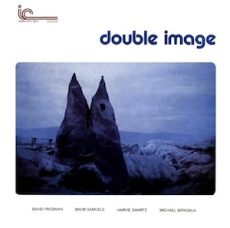
Daily Dose Of Jazz…
Michael DiPasqua was born May 4, 1953 born in Orlando, Florida into a highly musical family. He began his professional career very early, gigging as a drummer with a band co-led by Zoot Sims and Al Cohn while still in his mid-teens.
During the next few years DiPasqua played with Don Elliott and Gerry Mulligan, and also accompanied singers Jackie Cain and Roy Kral. Towards the end of the 70s, the drummer was for a number of years co-leader of Double Image, a vibraharp, marimba and bass quartet that toured internationally.
Michael then co-led Gallery and followed that with a spell in Later That Evening, a band led by Eberhard Weber, before joining Jan Garbarek. He was a consistently inventive percussionist with the ability to comfortably co-exist in a range of musical styles, from the modern end of the mainstream through jazz rock to the cutting edge of improvisational music.
He recorded three albums as a leader with his debut on the Inner City label in 1977. He went on to record as a sideman with Jan Garbarek for two albums, three with Eberhard Weber, and one each with Adelhard Roidinger and Robert Towner all for ECM. On a variety of other labels he recorded with Siegfried Fietz, Volker Kriegel, Marian McPartland, and Gerry Mulligan.
Beyond jazz, Michael was locally known for his role in helping to develop over 300 Subway Sandwich Shops in Central Florida, as well as co-founding PCMD Management Company, which owns and operates over 40 Subway franchises.
Cool jazz drummer and percussionist Michael DiPasqua lost his battle with cancer on August 29, 2016. He was 63.
More Posts: bandleader,drums,history,instrumental,jazz,music,percussion
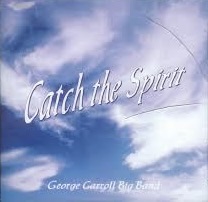
Daily Dose Of Jazz…
Eldon Payne was born in Morristown, Tennessee on April 25, 1957. He graduated cum laude from the University of Tennessee in Knoxville with a B.S. in Business Administration in 1979. Then he moved to Tampa, Florida in the spring of 1980.
Retiring from Delta Air Lines with twenty five years of service in 2008, Eldon performed during that period with the University of Tennessee Campus Band, Tampa Bay Buccaneer Band, Shades of Blue, Boulevard Jazz Orchestra, The Mostly Pops Orchestra, Helios Jazz Orchestra, Cigar City Big Band, Swing Sound Orchestra, Frankie D. New York Orchestra, Clearwater Community Jazz Band, Sun City Center Big Band, George Carroll Big Band, Gulf Bay Big Band, Ten O’clock Big Band, Frank Parsons Band, Ed Geimer Big Band, Encore IV Big Band, and The Sarasota Jazz Project.
Over the course of his career Payne has performed at several Florida clubs and festivals as well as backing the likes of Margo Rey, Denise Moore, Kathy Kosins, Michael Lynche, Bryan Hughes, Lorri Hafer, Chuck Wansley, Whitney James, Alexis Cole and the late Kevin Mahagony.
Trombonist Eldon Payne, who never recorded as a leader, continues to perform and record as a sideman and studio musician.
More Posts: history,instrumental,jazz,music,trombone
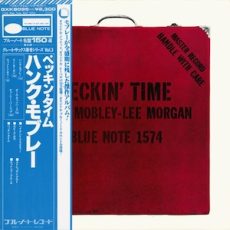
Requisites
Peckin’ Time ~ Hank Mobley and Lee Morgan | By Eddie Carter
This morning’s record from the library is a perfect description of the term “two heads are better than one.” During the fifties and sixties, tenor saxophonist Hank Mobley and trumpeter Lee Morgan collaborated on several jazz albums. Peckin’ Time (Blue Note BLP 1574/BST 81574) is a 1959 release and one of their earliest dates together. Hank composed four of the five tunes on this album. They are joined by a fabulous rhythm section: Wynton Kelly on piano, Paul Chambers on bass, and Charlie Persip on drums. My copy is the 1978 King Record Company Japanese Mono reissue (Blue Note BLP 1574 – GXK 8095).
Side One takes off with the quintet’s brisk melody to High and Flighty. Hank starts right out of the gate quickly. Lee gets into a robust reading next, and then Wynton gives an enthusiastic statement. Charlie shares the closing solo with both horns in a vigorous conversation until the ensemble’s lively climax. The album’s only standard, Speak Low by Kurt Weill and Ogden Nash comes to life with the rhythm section’s Latin introduction to Lee beginning the theme and Hank completing the melody. Mobley opens with a warm tone in a delicate statement. Wynton enters next with a fine flow of ideas, then Lee eases into the finale before the theme’s restatement and finish.
Peckin’ Time is a catchy original beginning in a medium groove for the quintet’s melody. Wynton breaks the ice with a joyous and carefree solo. Hank approaches the following reading with confidence; then, Lee cooks in the third statement. Paul takes a short walk toward the front line’s final exchange into the closing chorus. Stretchin’ Out raises the temperature to begin Side Two with the ensemble’s fleet theme. Morgan takes flight first with a festive solo. Kelly fuels the second statement with energy, and then Mobley heats things up further before exchanging a few riffs with Persip. The drummer has a short workout until Morgan and Mobley add a few last thoughts to the ending.
Git Go Blues begins with the trio’s introduction leading to the quintet’s easygoing theme, giving way to Hank’s cheery opening statement. Lee continues the good feelings in the following solo. Wynton follows them both with a relaxing performance. Paul adds a concise comment next; then Hank ties it all together until the quintet takes it out after the theme reprise. Alfred Lion produced Peckin’ Time, and Rudy Van Gelder recorded the session. The album’s sound quality is excellent with a superb soundstage in the highs, midrange, and low end that’s sure to stand out on any good mid-fi or high-end audio system.
Hank Mobley and Lee Morgan always worked well together, and they consistently complimented each other’s playing. Lee appeared on seven additional Blue Note LPs with Mobley. Hank appeared on three records with Morgan. If you’re a fan of either musician and in the mood for excellent hard-bop jazz, I highly recommend and offer for your consideration, Peckin’ Time by Hank Mobley and Lee Morgan, the next time you’re out record shopping. It’s an enjoyable and entertaining album that’s sure to please any jazz lover and demonstrates why “two heads are better than one” fits this duo perfectly!
A Caddy For Daddy (Blue Note BLP 4230/BST 84230), A Slice of The Top (Blue Note LT-995), Charisma (Blue Note BST 84312), Cornbread (Blue Note BLP 4222/BST 84222), Dippin’ (Blue Note BLP 4209/BST 84209), Hank Mobley Sextet (Blue Note BLP 1540/BST 81540), No Room For Squares (Blue Note BLP 4149/BST 84149), Straight No Filter (Blue Note BST 84435), The Rajah (Blue Note BST 84426), Third Season (Blue Note LT-1081) – Source: Discogs.com
~ Speak Low – Source: JazzStandards.com © 2024 by Edward Thomas Carter
More Posts: choice,classic,collectible,collector,history,instrumental,jazz,music,saxophone,trumpet



